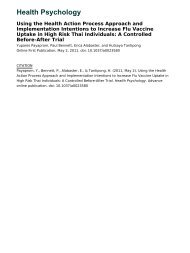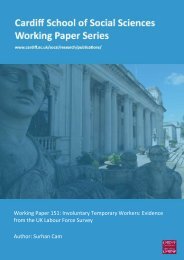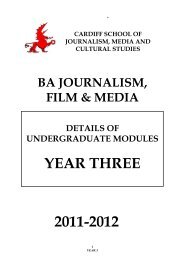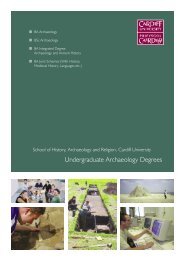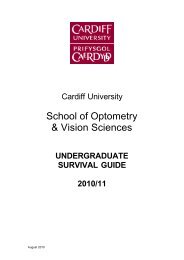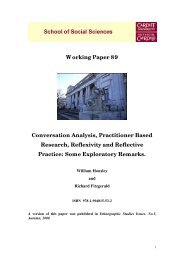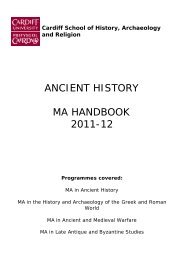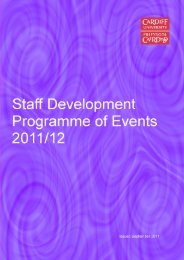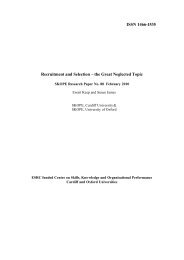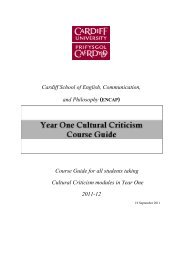Year 3 Catalogue 2011-2012 - Cardiff University
Year 3 Catalogue 2011-2012 - Cardiff University
Year 3 Catalogue 2011-2012 - Cardiff University
Create successful ePaper yourself
Turn your PDF publications into a flip-book with our unique Google optimized e-Paper software.
MODULE Brazil: Sociological and CODE: SI0150 SEMESTER(S) Both<br />
TITLE: Anthropological Perspectives<br />
MODULE Dr Sara Delamont CREDITS: 20 LEVEL: 3<br />
LEADER:<br />
CONTACT DETAILS Room 2.32 TEL: 029 20874035 E-MAIL: Delamont@cardiff.ac.uk<br />
MODULE AIM(S)<br />
To develop knowledge, understanding and skills in<br />
applying sociological and anthropological perspectives<br />
to Brazil.<br />
On completion of the module a typical student will<br />
be able to:<br />
KNOWLEDGE AND COMPREHENSION<br />
• Explain the major dimensions of class, race,<br />
gender, region and poverty in contemporary Brazil.<br />
• Appreciate the diversity of Brazilian society studied<br />
by scholars deploying sociological and<br />
anthropological methods.<br />
• Describe the key sociological and anthropological<br />
concepts relevant to Brazil.<br />
SKILLS (APPLICATION AND ANALYSIS)<br />
• Compare and contrast social science explanations<br />
of features of Brazilian culture.<br />
• Apply theoretical concepts from sociology and<br />
anthropology to Brazilian data.<br />
• Undertake and present scholarly work using a<br />
variety of sources including those independently<br />
identified.<br />
UNDERSTANDING (SYNTHESIS AND EVALUATION)<br />
• Demonstrate an understanding of social science<br />
research methods deployed in Brazil.<br />
• Evaluate different social science accounts of<br />
Brazilian s ociety.<br />
• Elucidate the relevance of key theoretical ideas to<br />
Brazilian society.<br />
TRANSFERABLE SKILLS<br />
The module will contribute to the development of the<br />
following transferable skills:<br />
Problem solving, information retrieval, comparative<br />
social science, communicating skills through written<br />
work.<br />
ARRANGEMENTS FOR FEEDBACK ON WORK<br />
Individual written feedback will be provided by the<br />
course convenor for the Summative Coursework.<br />
Generic issues will be posted on Learning Central.<br />
Generic exam feedback on a question by question<br />
basis will be provided.<br />
Any student who fails the module will get individual<br />
written feedback form the convenor (assuming SOCSI<br />
has a valid address for them).<br />
METHOD(S) AND WEIGHTING OF SUMMATIVE<br />
ASSESSMENT<br />
Coursework (essays) 50% 3500 words (Autumn)<br />
Written Examination 50% 1.5 hours (Spring)<br />
INDICATIVE READING<br />
Assuncao, M.R. (2005) Capoeira Routledge.<br />
Caldeira, T. (2001) City of Walls California UP.<br />
Harris, M. (2000) Life on the Amazon OUP.<br />
Hess, D. and Damatta, R. (eds) (1995) The Brazilian<br />
Puzzle Columbia UP.<br />
Patai, D. (1993) Brazilian Women Speak Rutgers UP.<br />
Reichmann, R. (eds) (1999) Race in Contemporary<br />
Brazil Penn State UP.<br />
Scheper-Hughes, N. (1992/2000) Death Without<br />
Weeping Yale UP.<br />
Stephens, N and Delamont, S (2009). ‘They start to get<br />
malicia’ BJSE 30,5, 537 - 548<br />
Telles, E.E. (2004) Race in Another America Princeton<br />
UP.<br />
Tierney, P. (1999) Darkness in Eldorado W.W. Norton.<br />
Twine, F.W. (1998) Racism in a Racial Democracy<br />
Rutgers UP.<br />
Wagley, C. (1976) Amazon Town OUP.<br />
SYNOPSIS OF MODULE CONTENT<br />
Key sociological concepts central to understanding<br />
Brazil (globalisation, colonialism, and post colonialism,<br />
ethnicity, ….). Key anthropological work on Brazil,<br />
especially on African-Brazilian religion, carnival,<br />
capoeira, sickness and poverty, folklore and magic.<br />
Patronage and Clientalist politics, race and ethnicity,<br />
and the economic system will be addressed from<br />
sociological and anthropological perspectives. The<br />
ethics and politics of anthropological work on<br />
Indigenous Brazilians will be explored.<br />
METHODS OF LEARNING AND TEACHING<br />
Lectures and seminars.<br />
OPPORTUNITIES FOR FORMATIVE ASSESSMENT<br />
A formative task is provided in the Autumn Semester.<br />
Individual written feedback will be provided by the<br />
seminar tutor, and any generic issues posted on<br />
Learning Central.<br />
16



